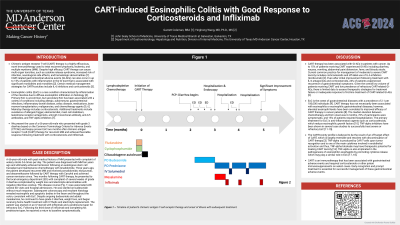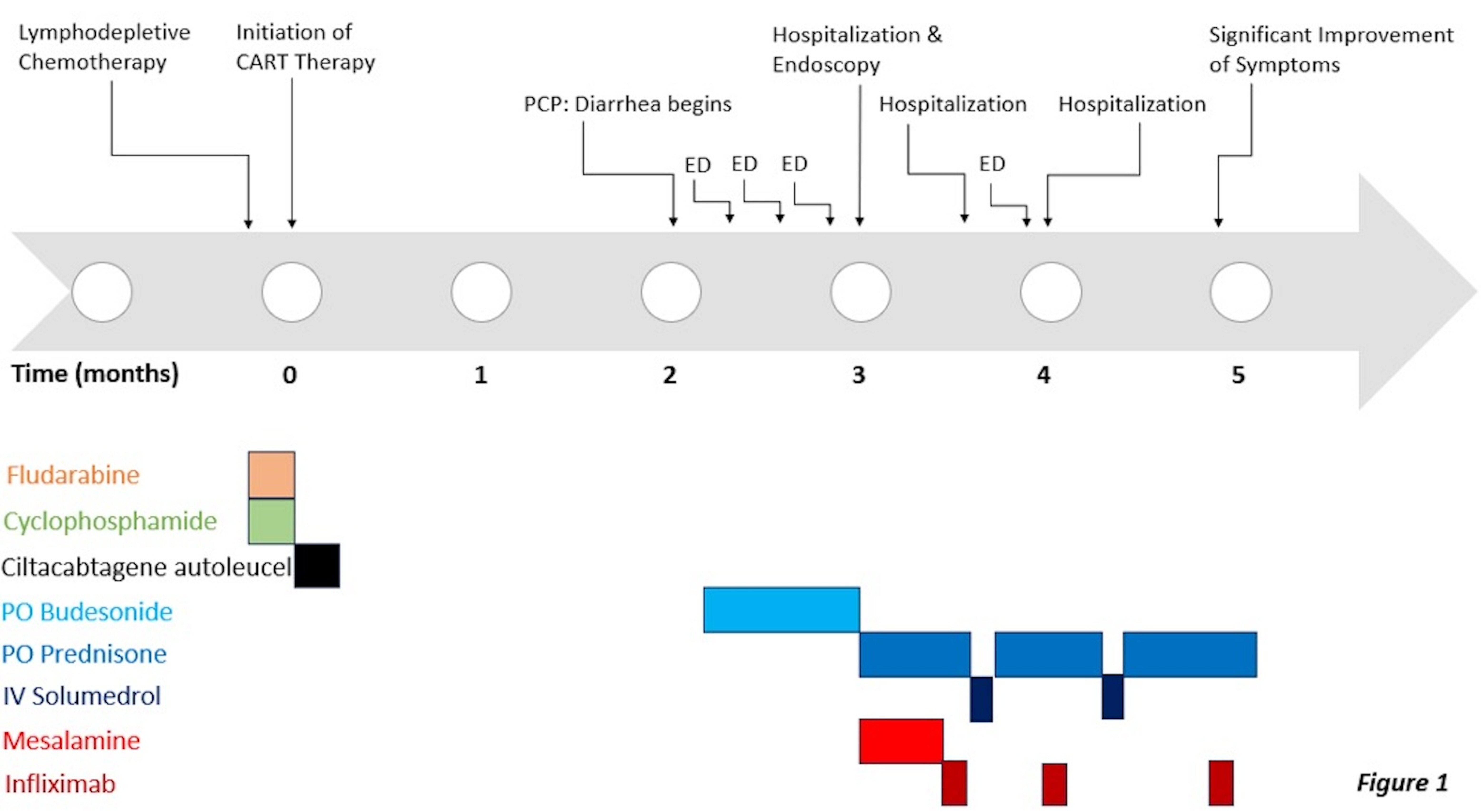Tuesday Poster Session
Category: Colon
P3722 - CART-Induced Eosinophilic Colitis With Good Response to Corticosteroids and Infliximab
Tuesday, October 29, 2024
10:30 AM - 4:00 PM ET
Location: Exhibit Hall E

Has Audio
.jpg)
Garrett T. Coleman
University of Texas Medical Branch, John Sealy School of Medicine
Galveston, TX
Presenting Author(s)
Garrett T. Coleman, 1, Yinghong Wang, MD, PhD2
1University of Texas Medical Branch, John Sealy School of Medicine, Galveston, TX; 2University of Texas MD Anderson Cancer Center, Houston, TX
Introduction: Chimeric antigen receptor T-cell (CART) therapy is a highly efficacious novel immunotherapy with known multi-organ toxicities, including gastrointestinal adverse events (GI-AEs). Eosinophilic colitis (EoC) is the inflammation of the intestine with diffuse eosinophilic infiltration. We present the case of a 66-year-old-male who presented with Common Terminology Criteria for Adverse Events (CTCAE) grade 3 diarrhea and biopsy proven EoC two months after CART therapy for recurrent multiple myeloma (MM) and achieved favorable response following corticosteroids and infliximab.
Case Description/Methods: A 66-year-old-male with past medical history of MM presented with complaint of watery stools 5-6 times per day. The patient was diagnosed with MM ten years ago and ultimately achieved remission following an autologous stem cell transplant and maintenance chemotherapy with lenalidomide. Three years ago, the patient developed recurrent MM and received pomalidomide, elotuzumab, and dexamethasone followed by CART therapy with Carvykti and achieved cancer remission since. Two months following CART therapy, he presented to the local emergency department (ED) with complaint of several weeks of grade 2 diarrhea complicated by weight loss and electrolyte abnormalities with negative infectious workup. This disease course (Fig. 1) was associated with several ED visits and hospital admissions. He was started on budesonide without much response. Subsequent colonoscopy and resultant histology revealed eosinophils and apoptotic bodies in the ileum and throughout the colon, consistent with EoC. Despite ongoing budesonide and added mesalamine, he continued to have grade 3 diarrhea, weight loss, and began receiving home health treatment with IV fluids and electrolyte replacement. The patient was started on an IV steroid with infliximab and a prednisone taper for refractory EoC. Following his third dose of infliximab and completing his prednisone taper, he reported a return to baseline symptomatically.
Discussion: CART is an immunotherapy that has been associated with GI-AEs and required corticosteroids or other potent immunosuppressants in select cases. EoC has been associated with a variety of conditions including cancer and cancer therapy and may require biologic agents. Early recognition and prompt treatment of immunotherapy toxicities is essential for successful management of gastrointestinal adverse events.

Disclosures:
Garrett T. Coleman, 1, Yinghong Wang, MD, PhD2. P3722 - CART-Induced Eosinophilic Colitis With Good Response to Corticosteroids and Infliximab, ACG 2024 Annual Scientific Meeting Abstracts. Philadelphia, PA: American College of Gastroenterology.
1University of Texas Medical Branch, John Sealy School of Medicine, Galveston, TX; 2University of Texas MD Anderson Cancer Center, Houston, TX
Introduction: Chimeric antigen receptor T-cell (CART) therapy is a highly efficacious novel immunotherapy with known multi-organ toxicities, including gastrointestinal adverse events (GI-AEs). Eosinophilic colitis (EoC) is the inflammation of the intestine with diffuse eosinophilic infiltration. We present the case of a 66-year-old-male who presented with Common Terminology Criteria for Adverse Events (CTCAE) grade 3 diarrhea and biopsy proven EoC two months after CART therapy for recurrent multiple myeloma (MM) and achieved favorable response following corticosteroids and infliximab.
Case Description/Methods: A 66-year-old-male with past medical history of MM presented with complaint of watery stools 5-6 times per day. The patient was diagnosed with MM ten years ago and ultimately achieved remission following an autologous stem cell transplant and maintenance chemotherapy with lenalidomide. Three years ago, the patient developed recurrent MM and received pomalidomide, elotuzumab, and dexamethasone followed by CART therapy with Carvykti and achieved cancer remission since. Two months following CART therapy, he presented to the local emergency department (ED) with complaint of several weeks of grade 2 diarrhea complicated by weight loss and electrolyte abnormalities with negative infectious workup. This disease course (Fig. 1) was associated with several ED visits and hospital admissions. He was started on budesonide without much response. Subsequent colonoscopy and resultant histology revealed eosinophils and apoptotic bodies in the ileum and throughout the colon, consistent with EoC. Despite ongoing budesonide and added mesalamine, he continued to have grade 3 diarrhea, weight loss, and began receiving home health treatment with IV fluids and electrolyte replacement. The patient was started on an IV steroid with infliximab and a prednisone taper for refractory EoC. Following his third dose of infliximab and completing his prednisone taper, he reported a return to baseline symptomatically.
Discussion: CART is an immunotherapy that has been associated with GI-AEs and required corticosteroids or other potent immunosuppressants in select cases. EoC has been associated with a variety of conditions including cancer and cancer therapy and may require biologic agents. Early recognition and prompt treatment of immunotherapy toxicities is essential for successful management of gastrointestinal adverse events.

Figure: Figure 1 – Timeline of patient’s chimeric antigen T-cell receptor therapy and onset of illness with subsequent treatment.
Disclosures:
Garrett Coleman indicated no relevant financial relationships.
Yinghong Wang: AzurRx – Consultant. Ilyapharma – Consultant. IOTA – Consultant. Sorriso – Consultant. Tillotts – Consultant.
Garrett T. Coleman, 1, Yinghong Wang, MD, PhD2. P3722 - CART-Induced Eosinophilic Colitis With Good Response to Corticosteroids and Infliximab, ACG 2024 Annual Scientific Meeting Abstracts. Philadelphia, PA: American College of Gastroenterology.
